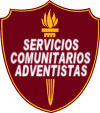Especialidades JA/Evaluación comunitaria/Respuestas
| Evaluación comunitaria | ||
|---|---|---|
| División Norteamericana Crecimiento espiritual, actividades misioneras y herencia
|
Destreza: 1 Año de introducción: 2009 |
|
Requisitos
|
La especialidad de Evaluación comunitaria es un componente de la Maestría Testificación. |
Prologue
1
Then Jesus went about all the cities and villages, teaching in their synagogues, preaching the gospel of the kingdom, and healing every sickness and every disease among the people. But when He saw the multitudes, He was moved with compassion for them, because they were weary and scattered, like sheep having no shepherd. Then He said to His disciples, “The harvest truly is plentiful, but the laborers are few. Therefore pray the Lord of the harvest to send out laborers into His harvest.”
2
Because this is your community, you should have some idea of where the greatest needs are. Match the size of the area on which you focus with the resources you have available, but don't forget that the Lord will provide for His own work.
3
If you live in the United States, most of this information can be gathered from the U.S Census Bureau at http://factfinder2.census.gov/faces/nav/jsf/pages/index.xhtml Just go there and enter a zip code. Working at a Zip Code level is going to be the easiest.
In Canada you will want to check Statistics Canada by Postal Code (quite a small area), Postal Code Range, or Urban Area.
3a
3b
3c
3d
3e
Housing information includes data such as the percentage of houses units that are apartments, single family homes, lot size, and whether the home is rented or owned. Single-family homes on large lots in urban areas indicates a higher level of income.
3f
Environmental data includes such things as the amount of land set aside for conservation or public access. Transportation includes figures such as the number of people who drive to work alone, carpool, walk, use public transportation, or work from home. It also includes the availability of public transportation (subway, bus service, etc).
4
This requirement will have to be planned well ahead of its execution. You will need signed permission slips for all the Pathfinders as well as a plan for transportation. Transportation could be as simple as walking around the neighborhood outside your church, or it could mean loading everyone up into vehicles and driving around.
If your club participates in a can collecting drive, you could do your awareness walk as you collect food.
When you are out looking around, here are some things to note:
- Homelessness
- Tents pitched in public places, in wooded areas along roadsides, etc
- Disheveled people sitting on park benches, etc
- People holding signs saying "Homeless" at street corners
- Panhandlers
- Unattended children
- Houses in disrepair
- Broken windows
- Houses needing paint
- Overgrown lawns
- Litter
- Graffiti
- Unmaintained parks
5
Requisito alternativo: Invitar a un líder comunitario o un profesional en la comunidad para hacer una presentación a su club de Conquistadores, grupo juvenil o iglesia para hablar sobre estos temas. Tomar notas durante la presentación.
These people carry with them a great deal of knowledge on local needs and services; they are familiar with local professional and volunteer organizations that operate in your area.
In the book Understanding Your Community by Monte Sahlin there is an entire chapter that explains how to do this. It includes a list of 50 civic leader roles that typically exist in communities in the United States, with specific questions for each of these roles. You can order this book at Center for Creative Ministry or AdventSource.
6
Don't be nervous about presenting before a group of people. Whether it is to the church board or to your unit, nobody there is watching and waiting for you to make a mistake. Most will be genuinely interested in seeing you succeed with your presentation. The church board will be very impressed with your desire to serve the Lord.
Make sure you prepare ahead of time. You can outline your presentation on a sheet of paper, or perhaps even prepare a slide show with your talking points. If you do prepare a slide show, make sure that it's not just a huge wall of text. If that's what you end up with, you would be better off with notes you look at yourself.
The most important thing to do during your presentation is to relax. Remember, it is not your plans and you that will be accepted or rejected, but rather, it is the Lord's plans. He can deal with it. All you need to do is present it.
Adventist Youth Honors Answer Book/ADRA/Community Assessment/Refs
- Categoría: Tiene imagen de insignia
- Adventist Youth Honors Answer Book/Honors/es
- Adventist Youth Honors Answer Book/es
- Adventist Youth Honors Answer Book/Skill Level 1/es
- Categoría: Libro de respuestas de especialidades JA/Especialidades introducidas en 2009
- Adventist Youth Honors Answer Book/North American Division/es
- Adventist Youth Honors Answer Book/Outreach/es
- Adventist Youth Honors Answer Book/Outreach/Primary/es
- Adventist Youth Honors Answer Book/Witnessing Master Award/es
- Adventist Youth Honors Answer Book/Stage 100/es


